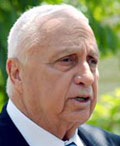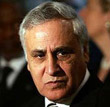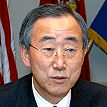|
|
|
Israeli president granted leave of absence
International |
2007/01/25 09:05
|
Israeli President Moshe Katsav, who may be indicted on rape and other sexual assault charges, had his request for a leave of absence granted Thursday by a parliamentary panel. Legislators approved the request, which could last up to six months, with a 13-11 vote.
Under Israeli law, Katsav had to receive the approval of a Knesset committee before he could be removed. On Tuesday, prosecutors said they have enough evidence to charge Katsav with rape, harassment, abusing his power for sex, obstructing justice and illegally distributing gifts while president and cabinet minister. Katsav has said publicly that he will resign if indicted. In an emotional news conference Wednesday, he blamed the media for their "witch hunt," "McCarthyism" and "persecution." Also on Wednesday, Israeli Prime Minister Ehud Olmert added to the growing political pressure on Katsav to resign. "Under these circumstances, there is no doubt in my mind that the president cannot continue to fulfill his position and he must leave the president's residence," Olmert said at a security conference. Attorney-General Meni Mazuz said Tuesday that while he planned to indict Katsav, he first wanted to give the president a chance to plead his case before him. The first woman to accuse Katsav came forward last summer accusing him of forcing her to have sex in his office. Other women then came forward with similar accusations. If found guilty, Katsav could face more than 20 years in prison.
|
|
|
|
|
|
|
Israeli president accused of raping four women
International |
2007/01/23 08:41
|
| Prosecutors intend to charge President Moshe Katsav with rape and other crimes against female employees, the Justice Ministry said on Tuesday, in what would be an unprecedented indictment against an Israeli head of state. Katsav has denied wrongdoing. His post is largely ceremonial and the scandal is unlikely to have a direct impact on Prime Minister Ehud Olmert -- who has himself been hurt politically by a string of investigations into suspected corruption, which he has denied. "The attorney-general, with the agreement of the state attorney, reached the conclusion that there is sufficient prima facie evidence to indict the president," the Justice Ministry said in a statement. The scandal erupted last year when several former staffers filed complaints with police, accusing Katsav of sex crimes. The ministry said an indictment would include the charge of raping one of the four women who accused Katsav of sexual assault. In the statement, Attorney-General Menachem Mazuz gave Katsav a last chance to present legal arguments before a final draft of the indictment, proposing a hearing at which he promised to hear the president's response with an "open heart and a willing soul". Asked on Channel 10 television if Katsav intended to resign, his lawyer, Sharon Nahari, said: "I think it is too early to say. What is important is that this is a very difficult day for Israel. We hope all will become clear after the hearing." The ministry said a date for the hearing would be set soon. While serving as president, Katsav can be put on trial only if he is impeached by parliament. He has said he would suspend himself from office if indicted. Katsav has been president since 2000 and is due to stand down in July. |
|
|
|
|
|
|
Former Saddam VP seeks to avoid death penalty
International |
2007/01/22 22:41
|
| A lawyer for Saddam-era Iraqi Vice President Taha Yassin Ramadan has filed an appeal with the Iraqi High Tribunal (IHT) arguing that the Tribunal's Appeals Chamber was not authorized to effectively direct its trial court to deliver a death penalty for Ramadan after originally according him a life sentence. Ramadan was convicted in November in connection with crimes against humanity committed in the town of Dujail in 1982. The Appeals Chamber ruled December 26 in its decision upholding Saddam Hussein's death sentence that a life sentence for Ramadan was too lenient and ordered the trial court to re-sentence him. The Trial Chamber is expected to issue a death sentence later this week. Ramadan lawyer Giovanni Di Stefano argued Sunday that the Appeals Chamber improperly relied on Article 24 of the IHT statute when directing the trial chamber to increase Ramadan's sentence. |
|
|
|
|
|
|
Iraqi draft oil law to offer oil transparency
International |
2007/01/21 05:02
|
An Iraqi cabinet-level committee proposed a draft law Friday that would allow the national government in Iraq to control oil revenues. Negotiations concerning the draft law have been a source of tension in Iraq for months as most Kurds and many Shiites want to retain control of the country's oil resources. On the other hand, Sunni Arabs, who do not dominate the oil-rich regions of the country, insist on central oversight. Recent debate has centered on the establishment of a federal committee, called the Federal Oil and Gas Council, to review oil contracts. Kurds did not want to give the committee the power to "approve" contracts, so the draft law instead allows regions to initiate and guide the process of awarding oil contracts and gives the committee the power to review and reject contracts. The Iraqi cabinet and the country's parliament must approve the draft before it becomes law. If the draft passes, enforcement might prove difficult in Iraq's wartime environment. |
|
|
|
|
|
|
Mexico extradites cartel kingpins to US
International |
2007/01/20 14:53
|
Mexico extradited drug kingpins Osiel Cardenas and Hector "El Guero" Palma and thirteen other major traffickers to the United States Friday as part of an effort by new Mexican president Felipe Calderon to follow through on a promise made by former President Vincente Fox to make increased extraditions to the US. Since taking office, Calderon has mobilized elite police and military forces against the rival Sinaloa and Gulf Cartels. Although the widely popular initiative is showing initial success, experts warn that Calderon must address the political and judicial corruption that allows cartels to run rampant in Mexico. Kingpins are often able to continue running their organizations from within corrupt Mexican prisons, making the extradition of leaders a key tool for scaling back cartel activity. In November 2005, the Supreme Court of Mexico ruled that prisoners serving life sentences can be extradited abroad, overturning a 2001 decision that prevented such prisoners from answering to charges in the US insofar as punishment there might be cruel and unusual and not directed at rehabilitation of the prisoner. A 1978 treaty between the US and Mexico still prevents the extradition of prisoners who face the death penalty. |
|
|
|
|
|
|
UN SG Ban concerned over stalled Hariri tribunal
International |
2007/01/18 06:54
|
| UN Secretary-General Ban Ki-moon said Wednesday that he is concerned about the status of ongoing discussions between the UN and Lebanon on the proposed UN-supported international tribunal to try suspects accused of assassinating former Lebanese Prime Minister Rafik Hariri in February 2005. Ban said: It is important that the Security Council has decided to establish a special tribunal. The United Nations has concluded agreement with the Lebanese Government. It is a source of concern for me, as Secretary-General, that we are not being able to establish a special tribunal, as was mandated by the Security Council. At the same time, I was encouraged by the willingness of the Lebanese Government to work together for the establishment of a special tribunal, including President Lahoud and Speaker of the Parliament Berri. I will discuss again this matter with the Lebanese leaders when I meet them in Paris.
The Lebanese cabinet approved a draft plan for the tribunal in November despite the resignation of all six pro-Syrian members. In December, Lebanese President Emile Lahoud formally refused to endorse the document, calling on the cabinet to take up the proposal again "when there is a legitimate and constitutional government." The measure has been approved by the UN but requires backing by both Lahoud and the Lebanese parliament before the tribunal can said to have been formally accepted. |
|
|
|
|
|
|
Iraqi leaders agree on draft oil law
International |
2007/01/18 05:18
|
| Iraqi officials have agreed a final draft of a law that sets rules for sharing Iraq’s oil wealth and aims to bring in billions of dollars of foreign investment to rebuild the mainstay of the economy. But crucially, international oil firms waiting for access to the world’s third biggest oil reserves will find little detail in the draft about the form future deals will take. They are likely to hold off major commitments until there is clarity. The draft calls for a federal committee headed by the prime minister to oversee future contracts and review deals signed under Saddam Hussein or by the Kurdish regional government, oil ministry spokesman Asim Jihad said. Passing an oil law to help settle potentially explosive disputes among Iraq’s ethnic and sectarian communities over the division of oil reserves has been a key demand of the United States in providing further military support to the government. Iraq’s Oil Committee of senior national and regional leaders has been drawing and redrawing the document for months and missed its own deadline of finalising it by the end of 2006. The Oil Committee, headed by Deputy Prime Minister Barham Salih, will send the draft to cabinet next week for approval. After that it will go to parliament. Officials hope that the broad base of the negotiating team means it will pass easily. The final draft was in line with earlier versions described last month after a previous round of talks. A national oil company will be set up to develop production and exports and the law is intended to ensure development of the oil industry across Iraq’s regions, Jihad said. It establishes a mechanism for centralising oil revenues and distributing them to the regions. Jihad refused to say who will negotiate with the international firms but explained a federal council will have the final word on approving the contracts. The division of oil is a key factor in communal tensions in Iraq. The southern oil fields around Basra lie in territory controlled by competing factions of the dominant Shi’ite Islamist political forces, The northern fields lie on the edge of Iraqi Kurdistan around the city of Kirkuk. Kurds want to annexe the city as their regional capital. The Sunni minority is concentrated in Baghdad and regions immediately to the north and west where there are few known hydrocarbon reserves. |
|
|
|
|
|
|
Class action or a representative action is a form of lawsuit in which a large group of people collectively bring a claim to court and/or in which a class of defendants is being sued. This form of collective lawsuit originated in the United States and is still predominantly a U.S. phenomenon, at least the U.S. variant of it. In the United States federal courts, class actions are governed by Federal Rules of Civil Procedure Rule. Since 1938, many states have adopted rules similar to the FRCP. However, some states like California have civil procedure systems which deviate significantly from the federal rules; the California Codes provide for four separate types of class actions. As a result, there are two separate treatises devoted solely to the complex topic of California class actions. Some states, such as Virginia, do not provide for any class actions, while others, such as New York, limit the types of claims that may be brought as class actions. They can construct your law firm a brand new website and help you redesign your existing law firm site to secure your place in the internet. |
Law Firm Directory
|
|








